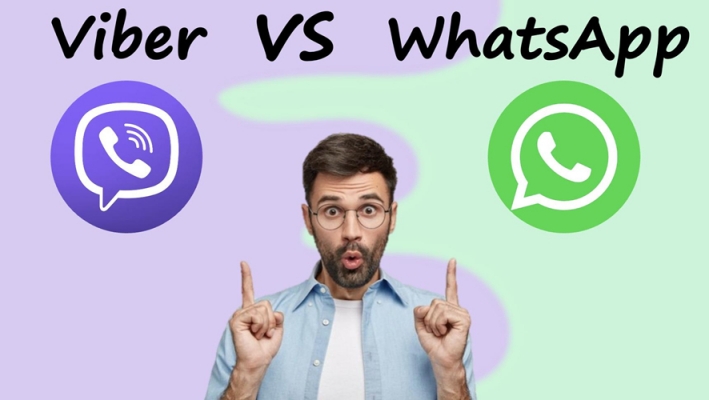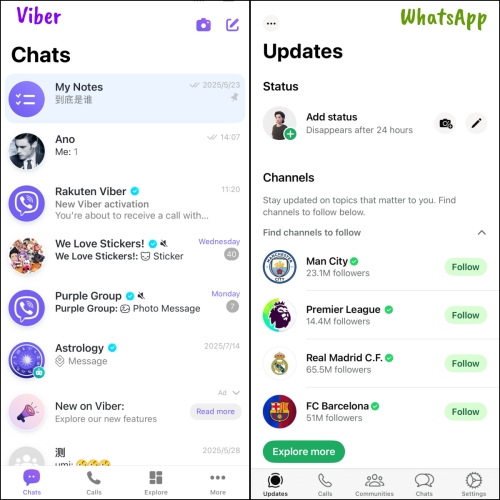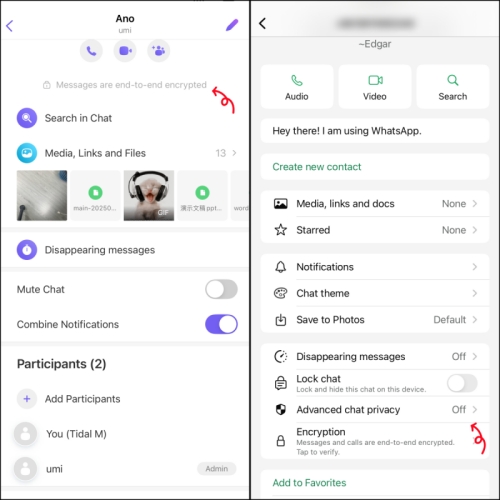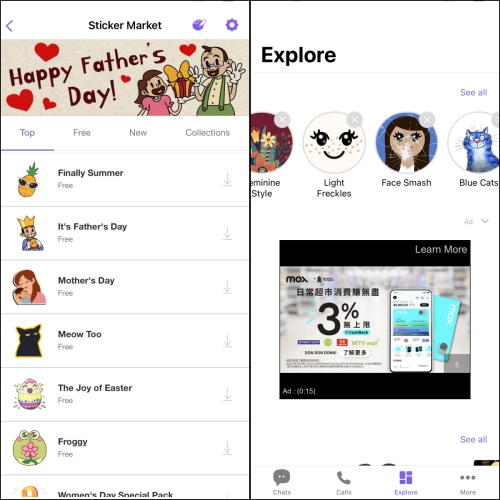In today's era of high-speed information flow, communication applications have become an indispensable part of people's daily lives. Whether it is to keep in touch with family or communicate across borders at work, it is crucial to choose a stable and feature-rich chat tool. Viber and WhatsApp, as world-renowned instant messaging applications, have attracted hundreds of millions of users with their respective features. But what are the differences between Viber and WhatsApp? And which one is better for you? This article will make an in-depth comparison of Viber and WhatsApp from multiple dimensions to help you make the best choice based on your needs.

- Part 1. Overview of Viber and WhatsApp
- Part 2. Viber vs WhatsApp: Difference between Viber and WhatsApp
- Part 3. Viber vs WhatsApp: Which Is Better for You
- Part 4. FAQs about Viber vs WhatsApp
- Part 5. Conclusion
Part 1. Overview of Viber and WhatsApp
What is Viber?
Viber, developed by Rakuten, is a cross-platform instant messaging app recognized for its high-quality voice calls and diverse features. It supports end-to-end encryption and offers a variety of features such as stickers, public communities, and hidden chats. Viber is especially popular in regions like Eastern Europe, the Middle East, and parts of Asia, geared toward users who prefer personalization and social interaction.
- Pros:
- Unique calling feature like Viber Out
- Strong in regional markets
- Hidden chats and message control
- Less data shared with third parties
- Abundant stickers and emotions
- Cons:
- Smaller global reach
- Many in-app ads
- Charged call to non-Viber user
- Need to pay for advanced features
What is WhatsApp?
WhatsApp, is operated by Meta and is one of the most widely used chat apps in the world. It has a simple interface and easy operation, allowing users to establish contact directly through their mobile phone number and enjoy end-to-end encrypted and secure communication. WhatsApp is particularly popular in regions like South Asia, Latin America, and Europe, catering to users seeking stability and efficiency.
- Pros:
- Huge global user base
- End-to-end encryption & security tools
- Rich business features
- Free call and message services
- Strong device compatibility
- Minimal ads
- Cons:
- Can't call non-WhatsApp users
- Lack of advanced features like CRM integration
- Shares metadata with Meta
- Limited international calling features
Both apps offer instant messaging, and of course, they also have their own unique features, let's take a look together.
Part 2. Viber vs WhatsApp: Difference between Viber and WhatsApp
Here we will tell you the difference between Viber and WhatsApp, helping you make a choice between them.
01Viber vs WhatsApp: User Interface
WhatsApp is known for being simple, efficient, and intuitive, allowing new users to adapt quickly. The interface design is very clean, with clearly visible media-sharing buttons, message threads, and group chat functionalities. It integrates seamlessly with your phone's contacts and provides smooth navigation—Update Calls, Communities, Chats, and Settings.

Viber, on the other hand, offers a more colorful and feature-rich interface, with more elements. The main interface contains tabs for communities, stickers, and services. While visually appealing, some users find its interface slightly more cluttered than WhatsApp's. That said, once familiarized, Viber's layout becomes easy to manage, especially for users looking for more than just messaging.
👍 Winner: WhatsApp for simplicity; Viber for variety.
02Viber vs WhatsApp: Messaging and Calling Features
Both Viber and WhatsApp offer high-quality free text, voice messages, one-on-one voice calls, and video calls via Wi-Fi or mobile data.
For Group Calls: Viber supports group voice and video calls with up to 8 people on your phone or up to 60 participants on your computer. The service is free for group voice or video calls from Viber to Viber. Compared to Viber, WhatsApp only enables users to conduct voice or video group calls with up to 32 participants.
For International Calls: WhatsApp does not support calling non-WhatsApp users for international calls. It's strictly VoIP-to-VoIP within its app. However, Viber offers Viber Out, allowing users to make cheap international to landlines and mobile numbers not using Viber, making it an ideal tool for global communication, especially in regions with limited smartphone penetration.
👍 Winner: Viber for advanced calling features.
03Viber vs WhatsApp: Privacy and Security
Both Viber and WhatsApp offer end-to-end encryption for enhanced security, with all messages, calls, photos, videos, and media in chats protected by end-to-end encryption protecting your privacy and preventing unauthorized access. However, there are still slight differences.

WhatsApp uses Signal Protocol for end-to-end encryption in chats and calls and offers two-factor authentication, encrypted backups, and contact verification. Although Viber doesn't fully apply end-to-end encryption to group chats and lacks two-factor authentication, it is known for Hidden Chats and self-destruct timers.
For ad targeting and integration, WhatsApp shares metadata with Meta, while Viber doesn't collect as much metadata as WhatsApp, offering more independence. If you're extremely privacy-conscious and want to avoid Meta-owned apps, Viber might feel safer.
👍 Winner: Viber for stronger privacy tools.
04Viber vs WhatsApp: Group Chat Management
Viber allows a secret group of 250 people by invitation for families or friends; The maximum number of groups allowed on WhatsApp is 1024. In addition, both apps have a Communities function, with an unlimited number of people, users can share safe and healthy information as they like, and community creator can set administrators, ban members, and block members.
👍 Winner: WhatsApp for larger amount of group member.
05Viber vs WhatsApp: Cross-Platform Syncing
Both Viber and WhatsApp are available on Android, iOS, Windows, Mac, and Web. Viber supports multi-platform syncing, and you can log in to your Viber account on different devices. The disadvantage is that it depends on the main device, if you want to use Viber on desktop, your mobile account also needs to be online.
WhatsApp allows users to share the same account across multiple devices, enabling seamless message sending and receiving without the need for the primary device to be online. This feature enhances user convenience and ensures that conversations remain accessible, regardless of the device being used.
👍 Winner: WhatsApp for better cross-device experience.
MagFone Chats Transfer
For better syncing and managing Viber and WhatsApp across devices, don't miss out MagFone Chats Transfer - an excellent tool to sync, back up, restore, and export WhatsApp and Viber.
06Viber vs WhatsApp: File Sharing and Media Quality
WhatsApp supports a wide range of file types, including photos, videos, PDFs, docs, and spreadsheets, with a maximum file size of 2GB. Viber supports more file types than WhatsApp, but with a higher file limit. In the file sharing process, WhatsApp automatically compresses images and videos, but Viber offers a higher-quality image and video transmission, with no force compression.
👍 Winner: Viber for better media and file quality.
07Viber vs WhatsApp: Fun Features
Both Viber and WhatsApp offer a wide range of stickers. Users can also make videos into GIFs through the app. In WhatsApp, users can create and dress up avatars to automatically generate avatar emoticons. Not limited to custom stickers and themes, WhatsApp has a Status feature, similar to Instagram Stories, which disappears 24 hours after posting.
Compared to WhatsApp, Viber thrives in personalization. Viber boasts massive library of free and paid sticker packs and animated emojis. Also, Viber offers AR filters and masks for video calls and selfies, built-in mini-games, public accounts, which is more entertaining and social.

👍 Winner: Viber for fun and creative messaging.
Part 3. Viber vs WhatsApp: Which Is Better for You
Both Viber and WhatsApp are wonderful messaging apps with various features. Not to say which is better than another, just to say which fits you more. Looking at a comparison of Viber and WhatsApp, you will get the answer.
| Feature | Viber | |
|---|---|---|
| End-to-End Encryption | Yes, limited to group encryption | Yes |
| Two-Factory Authentication | No | Yes |
| Desktop/Web Support | Yes | Yes |
| File Sharing Limit | 200 MB | 2 GB |
| International Calling | Yes | Yes |
| Group Calls Limit | 60 participants | 32 participants |
| Business Tools | Basic | Extensive |
| Ads Integration | Supported | Minimal |
In a word, Viber and WhatsApp are both excellent instant messengers, each offering various functions in terms of security, functionality, and user experience. Taking your needs into consideration, and combining with their comparison, you may already decide which to use.
Part 4. FAQs about Viber vs WhatsApp
Is Viber More Secure than WhatsApp?
In terms of security, both use end-to-end encryption to ensure that messages are visible only to the sender and the receiver. From the perspective of basic communication encryption, the two are comparable.
Is WhatsApp better than Viber?
Whether it is better depends on your usage needs. If you need a communication tool with the largest number of users worldwide, simple operation, and high integration with mobile phone contacts, WhatsApp is a more suitable choice. If you focus on voice call quality, community management functions, and more personalized experience, Viber may be more in line with your preferences. Both have their advantages, and the key lies in which features you value more.
Is Viber and WhatsApp the same?
Viber and WhatsApp are similar in basic functions, such as supporting text chat, voice and video calls, sending pictures and files, etc. They belong to the same category of applications, but they differ significantly in details and are suitable for users with different usage scenarios and preferences.
Part 5. Conclusion
Viber and WhatsApp are both excellent instant messaging tools, each with significant advantages in terms of security, functionality, and user experience. The best choice depends on your specific usage scenario, region, and personal preferences. I hope this comparison can help you make an informed decision and choose the communication tool that suits you best.

